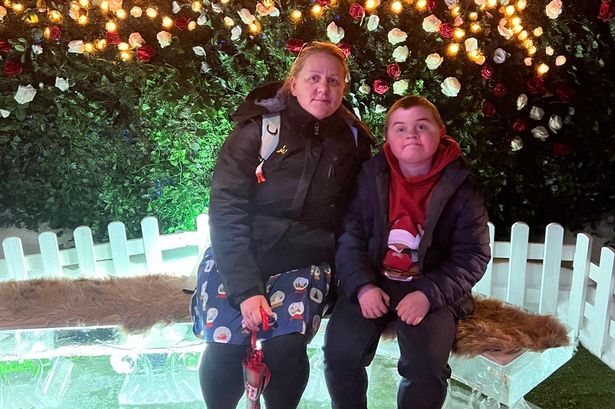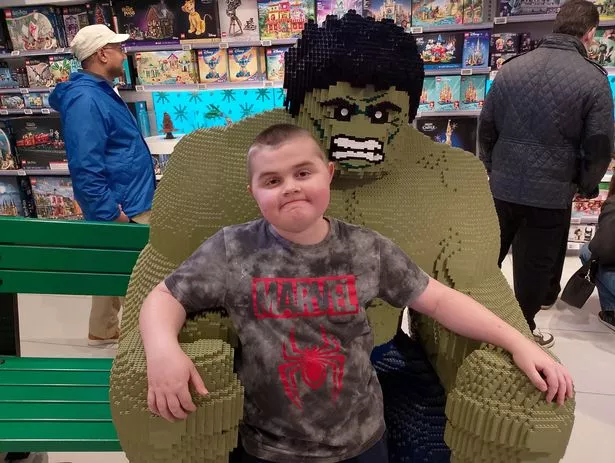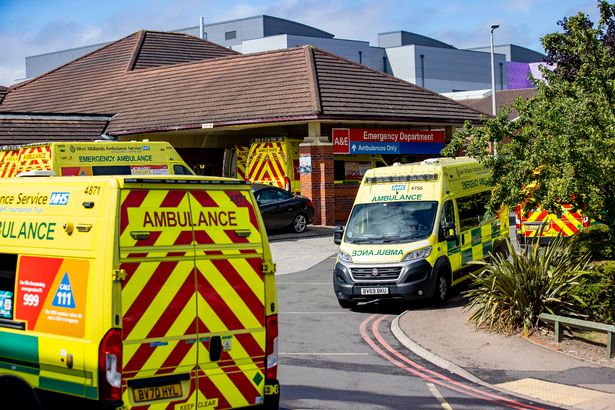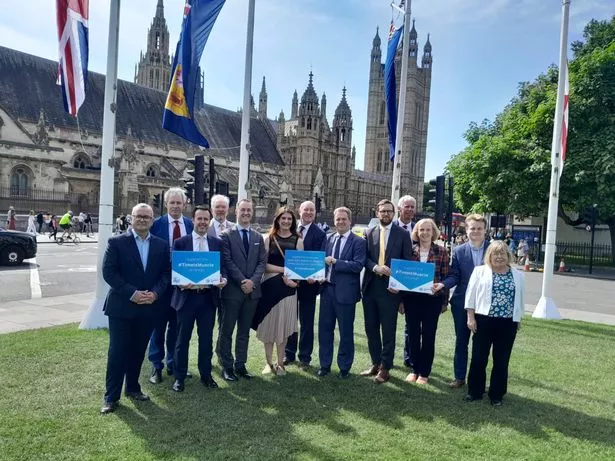Patients with life-limiting condition set to receive new treatment at Children’s Hospital but those at Heartlands must wait Rosemary Reid’s son Harry has Duchenne muscular dystrophy but cannot access a new drug at Heartlands Hospital.
Rosemary Reid’s son Harry has Duchenne muscular dystrophy but cannot access a new drug at Heartlands Hospital.
Children with a life-limiting condition face a “cruel postcode lottery” over a new drug – despite being treated at Birmingham hospitals just four miles apart.
Young patients at Birmingham Children’s Hospital are set to be given early access to medication, which could slow the progression of Duchenne muscular dystrophy (DMD) – but those at Heartlands will not.
A charity dedicated to the condition, which causes progressive muscle loss and has an average life expectancy of just 29, called the anomaly an “injustice”.
READ MORE: Family of girl with one in 50 million condition appeal to do ‘everything we can’
University Hospitals Birmingham NHS Foundation Trust, which runs Heartlands, confirmed it was not part of an early access programme which saw givinostat made available to some patients elsewhere.
 Harry Reid at the Lego store with a life size Hulk
Harry Reid at the Lego store with a life size Hulk
Rosemary Reid, whose 11-year-old son Harry has DMD and is under Heartlands’ care, said: “I always thought telling my son he would have a limited life and would lose the ability to walk would be the hardest thing I would have to do as a parent.
“I was wrong – trying to explain to an 11-year-old there was a new medicine he can’t have due to cost was.”
Rosemary, from Corby in Northamptonshire, added: “The essence of the NHS was to end inequality so all were entitled to the same treatments.
“I don’t understand how any Trust can take away from the child the ability to walk for longer or live for longer, it is beyond cruel.”
 Harry Reid in his motorised scooter
Harry Reid in his motorised scooter
Her views were echoed by Rachael Pratt, whose six-year-old son Lewis has DMD and is also being treated at the same Birmingham hospital.
She said: “This is heartbreaking and devastating for people with DMD and their families.
“Heartlands is a member of the NorthStar clinical network, which aims to optimise the care of patients with Duchenne muscular dystrophy.
“They currently participate in a number of clinical trials in DMD, and quote they are continuously working on expanding the capacity to participate in upcoming clinical trials. So why not givinostat?”
 Birmingham Heartlands Hospital(Image: Jonathan Hipkiss/Birmingham Mail)
Birmingham Heartlands Hospital(Image: Jonathan Hipkiss/Birmingham Mail)
The mum from Sheepy Magna in Leicestershire, continued: “People with Duchenne muscular dystrophy go through so much.
“Lewis is a wheelchair user but can still walk at times.
“He does physiotherapy and hydrotherapy, sleeps in his ankle orthosis, and takes daily steroids.
“He fundraises for equipment to meet his needs. He does so much to maintain his health and support his needs, the NHS and the government need to do their bit!”
Get breaking news on BirminghamLive WhatsApp, click the link to join
DMD is said to be the most severe form of muscular dystrophy, with around 2,500 sufferers in the UK. There is no cure.
Givinostat was approved by the Medicines and Healthcare products Regulatory Agency (MHRA) in December 2024.
It is undergoing a health technology appraisal by the National Institute for Health and Care Excellence (NICE) to decide whether it should be available on the NHS in England.
But manufacturer, ITF Pharma UK, has made it available for free to the NHS through an early access programme until NICE reaches a decision.
 Cross party MPs are calling for better access to wonder drug Givinostat, which helps children and young adults suffering from progressive muscle wasting disease, Duchenne muscular dystrophy
Cross party MPs are calling for better access to wonder drug Givinostat, which helps children and young adults suffering from progressive muscle wasting disease, Duchenne muscular dystrophy
The charity Duchenne UK said Birmingham Children’s Hospital, part of Birmingham Women’s and Children’s NHS Foundation Trust, had announced it was working to begin treating patients with givinostat in the next month.
It called the situation facing families of DMD patients at Heartlands “torture”. Co-founder and chief executive, Emily Reuben, whose son has the condition, said: “The only thing worse than having no treatment is knowing there is a treatment available but your child can’t access it.
“I am calling on University Hospitals Birmingham NHS Foundation Trust to end this torture for parents of children with DMD, and give them access to givinostat now.”
The access campaign has been backed by MPs including Lee Barron, who represents Rosemary’s family in Corby and East Northamptonshire. He said: “It is difficult enough for families without the added feeling of injustice as they see a postcode lottery for treatment that must end now.
“All children in every corner of the UK should have access to givinostat for treatment and I will continue to fight for my constituents to get that from the NHS.”
READ MORE: Dad who built £180k back garden bungalow for ill father has days to tear it down
University Hospitals Birmingham NHS Foundation Trust said it was ‘not right’ that the Trust did not have plans to deliver the drug for its patients.
It said it was not part of the Early Access Scheme and was awaiting national guidance from NICE.
A Trust spokesman said: “Although givinostat has been approved by the Medicines and Healthcare products Regulatory Agency (MHRA), we are not currently participating in the early access programme.
“However, we are committed to ensuring we are ready to begin treating patients with givinostat as soon as guidance from NICE allows.”
But a spokeswoman for Duchenne UK countered: “Birmingham Heartlands and University of Birmingham Hospitals Trust could have opted to take part in the Early Access Programme and give children with Duchenne muscular dystrophy a chance to be treated with givinostat now.
“They decided not to and cited prohibitive costs and the complexities of taking part as a reason not to, unlike other Trusts such as Leicester Royal Infirmary and Great Ormond Street Hospital who are taking part in it.”
